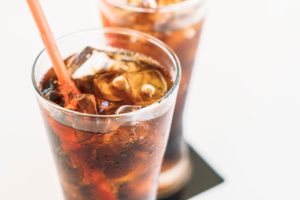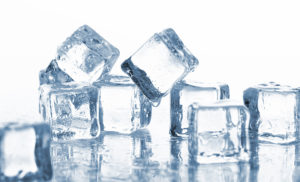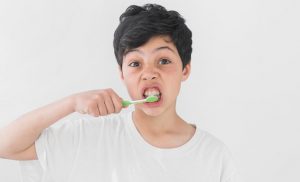Everything begins in the mind, including habits. It happens when our behaviour goes into autopilot mode, and the decision-making part of our brains enters into a kind of default mode— which means less brainpower is needed to carry out an activity. Meanwhile, bad habits can potentially put your life at risk if you don’t break the unhealthy loop. At our clinic, we have patients who encounter dental problems caused by daily “harmless” habits which they’re not even aware of. So here are 7 common everyday habits that could be ruining your teeth:
 Habit #1 Mouth breathing
Habit #1 Mouth breathing
This habit affects at least 6 out of 10 children and adults, and it’s associated with dry mouth and dry lips. Now that wearing a mask is a must when we’re out in public, for those who are not used to it, you may find yourself starting to breathe through the mouth more than ever. When your mouth gets dry, the lack of saliva can result in a higher risk of tooth decay.
Meanwhile, mouth breathing in children is quite alarming as it affects the growth and development of the jaw, and this leads to crooked teeth. What’s more, if it’s left untreated for extended periods of time, it can set the stage for other health problems. Some signs of mouth breathing you can look out for are sleeping with the mouth open, the habit of drooling and snoring, and nighttime teeth grinding (look at habit #5).
Habit #2 Drinking soft drinks
Soft drinks can be addictive and are also very harmful to our health. From diabetes to heart disease, you should really think twice before downing your next can of soft drink. Furthermore, the acids in these sugar-loaded drinks will wear away the enamel that is supposed to protect your precious teeth. As a result, it does not only change the appearance of your teeth, but also opens the door for bacteria which can cause cavities and infections. If you really cannot resist it, try drinking with a straw and then follow up with a water rinse.
 Habit #3 Chewing on ice
Habit #3 Chewing on ice
The best company on a hot and humid day—ice. In fact, some weight loss articles even promote ice munching as a healthier, zero-calorie “snack replacement”. From our standpoint, however, chewing on ice can damage your tooth enamel, and you may even risk cracking and chipping your teeth. Eventually, you may also find yourself extremely sensitive to the different temperature of food and drinks, which is not something you want to experience
Habit #4 Using teeth as openers
Can’t find a blade/scissors/bottle opener? Use anything but your teeth. You only have a set of permanent teeth so please treat it kindly. When you use your teeth as openers, you run the risk of chipping your teeth, cutting your gums, tongue, or lips, among others. It’s really not worth it.
 Habit #5 Grinding & clenching your teeth
Habit #5 Grinding & clenching your teeth
Teeth grinding and clenching is a condition known as ‘bruxism’, and it usually occurs while you’re asleep. Here are some signs that you could be unconsciously grinding your teeth:
- Wear marks in your teeth
- Gum recession
- Chipping of teeth
- Sensitive teeth
While bruxism is a common condition, heavy grinding may result in teeth aching and loosening, teeth wear, and exposing the dentine (the layer under enamel) which increases the risks of sensitivity, decay, and discolouration. In fact, nighttime grinding can also be a cause for constant headaches, neck and shoulder aches, and tired jaw muscles. Imagine working out in the gym 7 days a week without giving your muscles a rest, and then keep doing it week after week, year after year. But this is where we step in—our dentists are able to spot the signs of your grinding habits during your check-up.
If you noticed your child has bruxism, there are usually 2 views on this: 1) It’s a natural development of synaptic pruning that occurs in the basal ganglia, typically among kids between age 3 to 10. Put it simply, it’s the natural rewiring of the brain; 2) It can be due to the lack of space in the jaw, resulting in the tongue partially obstructing the airway. And this brings back habit #1.
 Habit #6 Brushing too hard or not brushing at all
Habit #6 Brushing too hard or not brushing at all
It may appear that brushing your teeth harder with stiffer bristles will help remove plaque and stains off your teeth better. On the contrary, aggressively brushing your teeth can wear down and damage both your gums and teeth in the long run. So always remember to brush in gentle circular motions, and the ideal toothbrush for most people is one with a small head and medium-to-soft bristles. We also encourage simple massaging of the gums to gently remove plaque and this will keep your gums healthy too.
As for people who skip toothbrushing every now and then, the effects are more than just bad breath and a few cavities. Your mouth is the gateway to your body. This means that the health of your mouth can also affect your overall health.
Habit #7 Not going for dental check-ups regularly
In general, you should be visiting your dentist at least twice a year to ensure optimum oral and dental health. When you’re proactive, we’re able to help catch any potential issues early and offer you the best solution before it turns into a serious problem. Also, with regular checking and cleaning, you will grow more comfortable with these sessions as there’s less inflammation of the gums!If you’re due for a dental check-up, come book an appointment with us!
Have a specific topic that you would like us to talk about? Just let us know!


 Habit #1 Mouth breathing
Habit #1 Mouth breathing
 Habit #3 Chewing on ice
Habit #3 Chewing on ice Habit #5 Grinding & clenching your teeth
Habit #5 Grinding & clenching your teeth Habit #6 Brushing too hard or not brushing at all
Habit #6 Brushing too hard or not brushing at all


